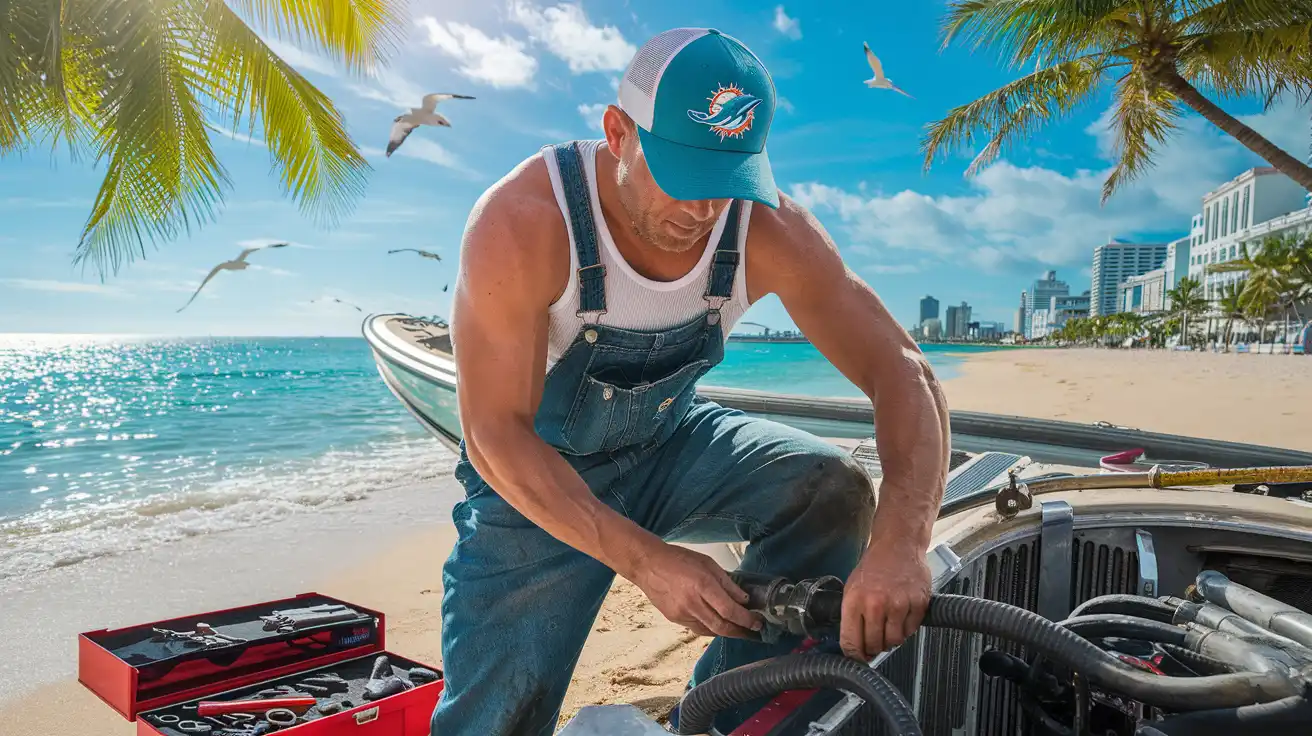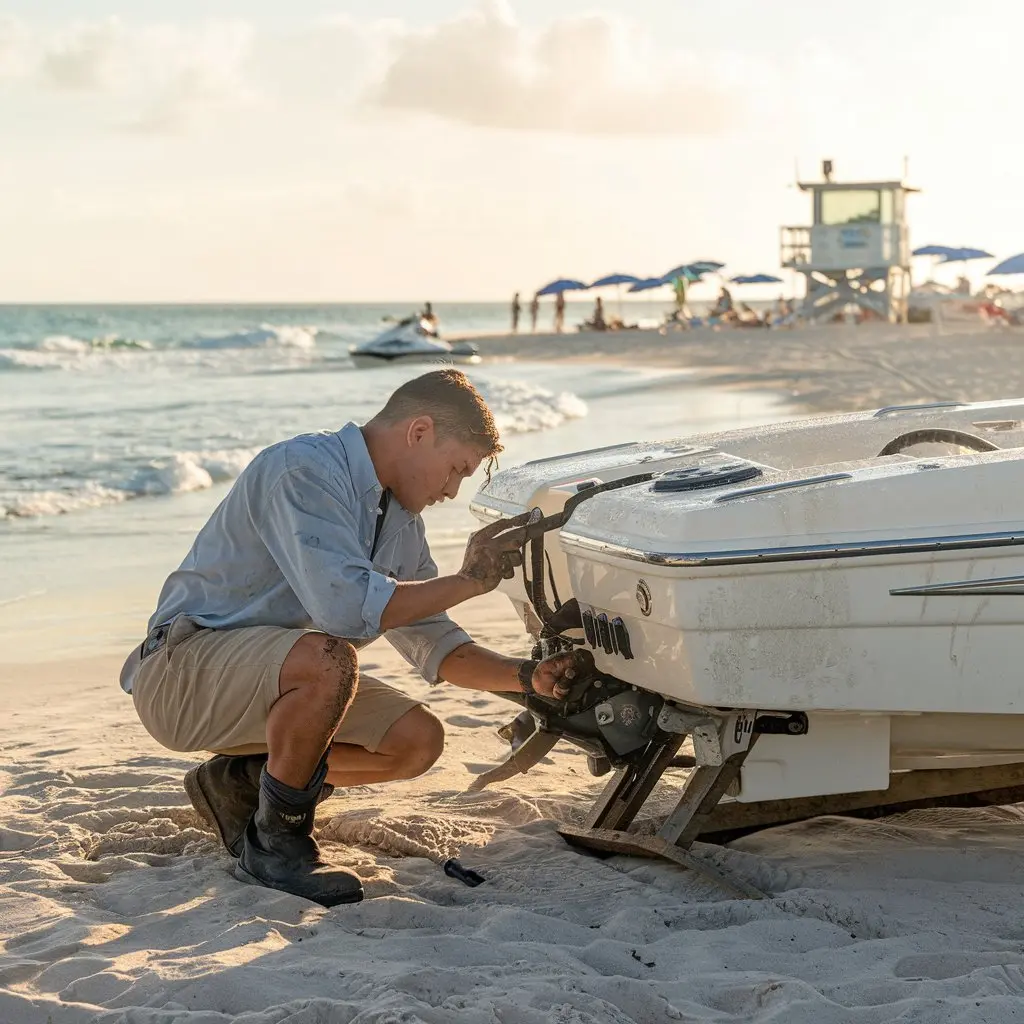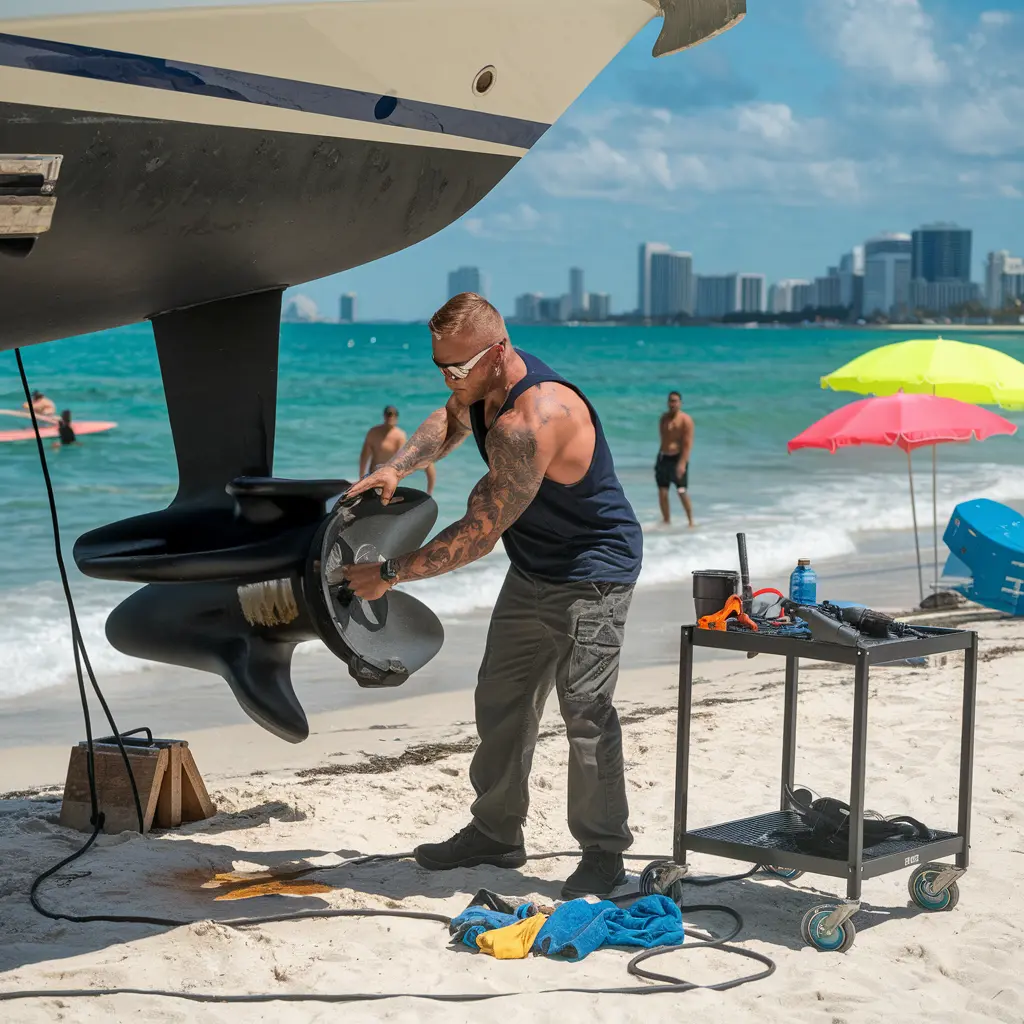Essential Cost Guide for Common Boat Repairs in Miami 2025
April 21, 2025 |
By Ali

Miami’s boating scene is alive and well, but with that comes the need for regular boat repairs. Whether you’re cruising Biscayne Bay or fishing in the Atlantic, knowing what repairs you might face is key to keeping your vessel in good shape. This cost guide for common boat repairs in Miami will help you understand what to expect in 2025, from engine issues to electrical upgrades and everything in between.
Key Takeaways
- Regular engine upkeep is essential to avoid bigger problems later.
- Fiberglass repairs can make your boat look great and keep it safe.
- Upgrading electrical systems boosts safety and reliability.
- Routine cleaning helps maintain your boat’s appearance.
- Having access to emergency repair services is important for unexpected issues.
Understanding Common Boat Repairs in Miami
Key Takeaways
When you own a boat in Miami, keeping it in good shape is super important. The saltwater and constant sun can really do a number on your vessel. Knowing what repairs to expect can save you a lot of money and stress.
- Regular engine maintenance is a must for good performance.
- Fiberglass repairs keep your boat looking good and structurally sound.
- Electrical upgrades can make your boat safer and more functional.
- Routine cleaning helps keep your boat in top shape.
- Knowing where to find emergency repair services is key for quick fixes.
Types of Repairs to Consider
Miami boaters face some unique challenges. Saltwater corrosion is a big one, and so is damage from the sun. Here are some common repairs you might run into:
- Engine repairs: This can include anything from simple tune-ups to major overhauls. Overheating is a common issue.
- Fiberglass work: Dings, cracks, and blisters are all common, and need to be addressed to prevent further damage.
- Electrical issues: Saltwater can wreak havoc on wiring and connections. Upgrades might be needed to enhance safety.
- Hull maintenance: Keeping the hull clean and free of barnacles is essential for performance.
- Upholstery repair: The sun can fade and crack upholstery quickly, so repairs or replacements are often needed.
Keeping a log of all the repairs and maintenance you do on your boat is a smart move. It helps you keep track of what’s been done and gives valuable info for future repairs. Include dates, descriptions of the work, and who did the work. This is super helpful if you ever decide to sell your boat.
Importance of Regular Maintenance
Regular maintenance is key to avoiding big, expensive repairs down the road. Think of it like taking your car in for an oil change – it’s a small investment that can prevent major engine problems. Here’s why it matters:
- Prevents costly repairs: Catching small problems early can stop them from turning into big ones.
- Extends the life of your boat: Regular maintenance helps keep all the systems in good working order.
- Maintains resale value: A well-maintained boat is worth more when you decide to sell it.
- Ensures safety: Making sure all systems are working properly helps keep you and your passengers safe.
- Improves performance: A clean hull and well-tuned engine will improve your boat’s performance and fuel efficiency.
Engine Repair Services
Common Engine Issues
Boat engines in Miami face a unique set of challenges. The saltwater environment is particularly harsh, leading to corrosion and wear and tear on engine components. Overheating is another frequent problem, often caused by clogged cooling systems due to marine growth. Fuel-related issues, such as ethanol-related fuel separation and contaminated fuel, are also common culprits behind engine troubles.
Regular use is important, but so is proper winterization if the boat sits idle for extended periods. Ignoring these factors can lead to significant engine problems down the line.
Cost of Engine Repairs
Engine repair costs can vary widely depending on the type of engine (inboard, outboard, or sterndrive), the severity of the problem, and the mechanic’s hourly rate. Here’s a general idea of what you might expect to pay:
- Minor Tune-Up: $200 – $500 (includes spark plugs, filters, and fluid changes)
- Carburetor Repair/Replacement: $300 – $800
- Fuel Injector Service: $250 – $600
- Water Pump Replacement: $300 – $700
- Major Overhaul: $2,000 – $8,000+ (depending on engine size and complexity)
These are just estimates, and it’s always best to get a quote from a qualified mechanic. Don’t forget to ask about labor costs, which can significantly impact the final bill. For example, if you need Yamaha outboard parts, that will be an additional cost.
Preventative Maintenance Tips
Preventative maintenance is key to extending the life of your boat engine and avoiding costly repairs. Here are some essential tips:
- Regularly flush the engine with fresh water after each use, especially after saltwater exposure.
- Change the oil and filters according to the manufacturer’s recommendations.
- Inspect and clean the cooling system regularly to prevent overheating.
- Use fuel stabilizers to prevent fuel-related problems, especially during storage.
- Check and replace worn hoses, belts, and clamps.
By following these simple maintenance practices, you can significantly reduce the risk of engine problems and keep your boat running smoothly for years to come. It’s a small investment that can save you a lot of money and hassle in the long run.

Fiberglass Repair Techniques
Identifying Fiberglass Damage
Okay, so you’ve noticed some damage to your boat’s fiberglass. First things first, you need to figure out what kind of damage you’re dealing with. Is it a small scratch, a crack, or a full-blown hole? Identifying the type of damage is the first step in figuring out how to fix it. Small scratches are usually cosmetic, but cracks and holes can let water in, which can cause bigger problems down the road.
Look closely for any signs of delamination (where the layers of fiberglass are separating) or soft spots, which could indicate rot in the core material.
Repair Costs and Materials
Alright, let’s talk money and materials. The cost of fiberglass repair can vary a lot depending on the extent of the damage and whether you’re doing it yourself or hiring a pro. For small stuff, like surface scratches, you might only need a gel coat repair kit, which can cost around $30-$50. For bigger repairs, you’ll need fiberglass cloth, resin, hardener, and maybe some fairing compound.
Expect to pay anywhere from $100 to several hundred dollars for materials, depending on the size of the repair. Professional repairs can easily run into the thousands, especially if there’s structural damage. Here’s a rough idea of material costs:
| Material | Estimated Cost |
|---|---|
| Gel Coat Repair Kit | $30 – $50 |
| Fiberglass Cloth | $20 – $40/yard |
| Resin | $30 – $50/gallon |
| Fairing Compound | $20 – $40/gallon |
DIY vs. Professional Repairs
So, should you try to fix that fiberglass damage yourself, or should you call in the pros? That’s the big question, right? DIY fiberglass repair can save you a lot of money, but it also requires some skill and patience. If you’re comfortable working with tools and don’t mind getting a little messy, then a small repair might be a good DIY project.
However, if the damage is extensive or involves structural components, it’s almost always better to hire a professional. They have the experience and equipment to ensure the repair is done correctly and safely. Plus, a bad DIY repair can actually make the problem worse and end up costing you more in the long run. When considering boat construction techniques, remember that professional repairs often come with a warranty, giving you peace of mind.
Doing it yourself can be rewarding, but it’s important to be realistic about your abilities. If you’re not sure, it’s always best to err on the side of caution and consult with a professional. Your boat (and your wallet) will thank you.
Electrical System Upgrades
Okay, so your boat’s electrical system is acting up? Or maybe you’re just looking to modernize things a bit? Either way, you’ve come to the right place. Electrical upgrades are a pretty common thing around here, especially with the saltwater and humidity doing their best to corrode everything. I remember last summer, my buddy’s boat had a complete electrical meltdown mid-trip – not fun. Let’s talk about some of the upgrades we see most often.
Common Electrical Problems
Electrical issues on boats can be a real headache. Corrosion is a huge problem, especially in Miami’s salty air. You might see things like:
- Flickering lights
- Dead batteries
- Faulty wiring
- Malfunctioning navigation systems
Regular checks can help catch these problems early.
Cost of Electrical Repairs
Alright, let’s talk money. The cost of electrical repairs can vary a lot depending on the problem. Simple fixes, like replacing a fuse, might only set you back $50-$100. But, if you need to rewire the whole boat, you could be looking at a bill of $1,000 or more. Here’s a rough idea:
| Repair Type | Estimated Cost | Notes |
|---|---|---|
| Fuse Replacement | $50 – $100 | Quick and easy |
| Battery Replacement | $200 – $500 | Depends on battery type |
| Wiring Repair | $300 – $800 | Can vary based on extent of damage |
| Complete Rewiring | $1,000+ | For older boats with extensive damage |
Safety Considerations
When it comes to boat electrics, safety is key. Always disconnect the power before you start working on anything. Make sure all your wiring is marine-grade and properly insulated. And, if you’re not comfortable doing the work yourself, hire a professional. Seriously, it’s not worth risking your boat or your safety.
Electrical systems on a boat are no joke. Saltwater and electricity don’t mix, and a small mistake can turn into a big problem fast. Always double-check your work, and don’t be afraid to ask for help if you’re not sure what you’re doing.

Routine Maintenance Practices
Keeping your boat in good shape isn’t just about the occasional wash down; it’s about establishing solid routine maintenance. Think of it as preventative care for your vessel. A little effort now can save you from big headaches and expenses down the line.
Monthly Maintenance Checklist
Every month, run through a quick checklist to catch small issues before they become big problems. This is the time to check things like:
- Inspect fluid levels: Oil, coolant, and hydraulic fluids should all be at the correct levels.
- Check the battery terminals for corrosion and clean them as needed. A wire brush and some baking soda solution work wonders.
- Inspect the bilges for any standing water or unusual smells, which could indicate a leak.
Quarterly Inspections
Every three months, take a more in-depth look at your boat’s systems. This is a good time to:
- Change the oil and filters. Clean oil keeps your engine running smoothly.
- Inspect the boat hull for any signs of damage, such as cracks or blisters. Address these issues promptly to prevent further damage.
- Check the condition of your hoses and belts. Replace any that are cracked, worn, or showing signs of deterioration.
Annual Service Recommendations
Once a year, it’s time for a comprehensive service by a qualified marine mechanic. This should include:
- A thorough engine inspection, including compression testing and spark plug replacement.
- A check of the electrical system, including wiring, connections, and charging system.
- Inspection of the steering and control systems, including cables, linkages, and hydraulics.
Regular maintenance is like brushing your teeth; you might not see the immediate benefits, but you’ll definitely notice the consequences of neglecting it over time. Skipping routine checks can lead to bigger problems, like a clogged fuel line during a weekend trip. Twice-a-year inspections are a good idea, once before peak season and again in the fall. This helps catch wear-and-tear from heavy summer use.
Finding Reliable Repair Services
Researching Local Professionals
Finding a good boat mechanic can feel like a treasure hunt. Start by asking fellow boaters for recommendations. Word-of-mouth is often the best way to find someone trustworthy. Check with your marina neighbors, boating club members, or even local tackle shops. Compile a list of potential candidates before you start digging deeper.
Online Reviews and Recommendations
Online reviews can be a mixed bag, but they’re still a useful tool. Look for patterns in the reviews. Are there consistent complaints about communication, pricing, or the quality of work? Don’t rely solely on star ratings; read the actual comments to get a better sense of the boat repair Miami FL shop’s reputation. Also, check if the shop responds to reviews, as this can indicate their level of customer service.
Building Relationships with Repair Shops
Building a relationship with a repair shop before you actually need them can save you a lot of stress down the road. Stop by a few shops, introduce yourself, and ask some general questions about their services. This gives you a chance to assess their professionalism and get a feel for their expertise. It’s also a good idea to keep a log of all maintenance and repairs done on your boat. This will help you communicate effectively with the mechanic and ensure that they have a complete understanding of your boat’s history.
Consider these points when choosing a boat repair shop:
- Do they specialize in your boat’s make and model?
- Are they certified by any relevant organizations?
- Do they offer a warranty on their work?
DIY Boat Repairs
Benefits of DIY Repairs
So, you’re thinking about fixing your boat yourself? That’s cool! One of the best things is saving money. Professional repairs can cost a lot, and doing it yourself cuts out those labor costs. Plus, you get a good feeling from fixing something yourself. You also learn a lot about your boat, which can be super helpful later on. It’s also convenient because you can work when you have time, instead of waiting for a repair shop to be available. There are many benefits of regular boat repairs.
When to Hire a Professional
Deciding between doing it yourself or hiring someone really depends on what you know and how comfortable you feel. Doing small jobs can save you money, but if you’re not sure what you’re doing, it could cost you more in the end. Pros can spot problems before they get big, which can save you from trouble.
Plus, they have the right tools and experience to do the job right. So, think about your options. If you feel good about your DIY skills, go for it! But if you’re not sure, it might be better to let the experts handle it. Either way, keeping your boat in good shape is what matters. Safety is key.
Cost Comparisons and Hidden Expenses
Doing it yourself can be great, but it’s important to know what you’re getting into. Here are some things to think about:
- Mistakes: If you mess something up, it can cause more damage and cost even more to fix.
- Tools: You might need special tools that you don’t already have. Buying boat repair tools can add up.
- Time: Your time is valuable. How much is your free time worth?
Doing it yourself can be rewarding, but it’s important to be realistic about your skills and the potential costs. Sometimes, the peace of mind that comes with a professional repair is worth the extra money. It’s about weighing the risks and rewards.
Wrapping It Up: Boat Repairs Cost in Miami
In conclusion, keeping your boat in good shape in Miami is no small task. With the sun and saltwater constantly working against you, regular maintenance is key. Whether you’re dealing with engine troubles or fixing up fiberglass, it’s better to address issues early on. Don’t wait until a small problem turns into a big headache. If you’re not sure about a repair, don’t hesitate to reach out to a local shop. They know the local waters and can help keep your boat running smoothly. Happy boating!
Frequently Asked Questions
How often should I have my boat inspected in Miami?
You should check your boat every month and have a full service every 3 to 4 months, depending on how much you use it.
What makes boat repairs in Miami special?
The saltwater and sun can cause unique problems, so repairs need to focus on preventing corrosion and UV damage.
What is the typical cost of boat repairs?
Repair costs can vary widely. Small fixes might cost a few hundred dollars, while larger repairs can be more expensive. Regular maintenance can help you avoid big bills.
What are some common engine repairs?
Common engine problems include overheating, often caused by clogged cooling systems, and oil leaks.
When should I consider doing repairs myself versus hiring a pro?
If the repair is simple, like changing oil or painting, you might do it yourself. But for complicated or safety-related repairs, it’s best to hire a professional.
How can I find trustworthy repair services in Miami?
Look for online reviews, ask friends for recommendations, and check local boating groups to find reliable repair services.

Ali
Ali Hassan is a seasoned SEO content writer with over 10 years of experience in crafting high-performing content for WordPress websites. Specializing in keyword-rich blog posts, landing pages, and service descriptions, Ali blends technical SEO knowledge with engaging storytelling to drive organic traffic and improve search engine rankings.

